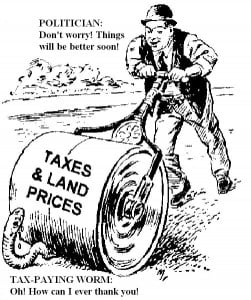The ABC’s “Q&A” was set in Albury/Wodonga last night as it discussed the problems existing in Australia’s regions. Most of these were obviously heartfelt by the big local audience.
There’s no doubt the coastal capital cities win out revenue-wise, and otherwise, and those in the regions, having grown most of Australia’s produce, go without as they also pay more in petrol for living outside the capital cities.
How do we deliver equivalent infrastructure to them? Do they have to make do with occasional carrots, such as the $65 million cancer clinic Minister for Regional Australia, Regional Development and Local Government and the Arts, Simon Crean, promised will be in this year’s budget?
Regional issues seemed endless. At least the national broadband network offered them a superhighway on which better health and education services might be delivered, most agreed.
But not one of Tony Jones’ Q&A guests, nor one of the people in the audience, got to grips with their greatest problem, which paradoxically also offers the only real solution to their long list.
People in the regions pay the same taxes as those in the cities. “That’s fair!” do I hear you cry? But what if the taxes paid, both by people in the cities and the regions, are patently unfair because they penalise production and reward property speculation?
What if there was a better source of revenue that recognised, perfectly, all the problems in the regions? What if Australia was to make a revenue switch based upon land values?
Land values are lower in the regions because of their smaller population, locational, capital works and facility disparities when compared with the cities.
Therefore, rural and regional areas would clearly be benefitted by the abolition of the 128 taxes and the re-introduction of a federal land tax recommended in “Australia’s Future Tax System” by Ken Henry’s panel – but Tony Jones, the Q&A panel and his audience showed this is not even showing up on their radar. Why not? Their circumstances would see them paying far less to each level of government.
Such is the ignorance on the issue of land value-based revenues that former Olympian and Gold Coast City Council mayor, Ron Clark, has been pleased to announce (in connection with the introduction of site value rating) that almost 50% of his municipality was “eligible” to pay the minimum rate. That sounds nice, doesn’t it: “I’m eligible to pay the minimum rate.” But let’s examine what it really means.
It means that people with lower-valued properties are having to pay more than if they were to pay the same rate in the dollar on their land value as is paid by the owners of more valuable land. Lower value property owners are therefore subsidising higher-valued properties, or, put another way, the Gold Coast City Council has progressed that half of the people with the least valuable properties onto what amounts to a poll tax. And yet people found the gumption to revolt in the streets of London in 1990 when Margaret Thatcher tried to introduce a poll tax; but we don’t revolt, we cop it in the neck.
If the rating base is land values, then land values it should remain – and there must be no minimum rate – but the theory and benefits of land value taxation are as badly understood in the regions as they are here in the cities. So, we continue to be screwed.
Meanwhile, as Q&A avoided the issue of how land-based revenues at local, state and federal levels might assist rural and regional areas in particular, Australia’s handful of uber-wealthy rent-seekers rubbed its hands that the secret of its free ride at the people’s expense remains a mystery.
[FWIW, I’ve written on the subject of decentralisation in Online Opinion.]
.
 Prosper Australia
Prosper Australia


 My colleague at the Land Values Research Group, Dr Gavin Putland, has a nose for smelling out bulltish.
My colleague at the Land Values Research Group, Dr Gavin Putland, has a nose for smelling out bulltish. LAND AND RESOURCE RENTS – OUR BLIND SPOT?
LAND AND RESOURCE RENTS – OUR BLIND SPOT?